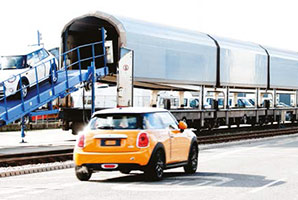“109 Berth is being upgraded and rebuilt, with new container handling equipment and a concrete loading pad; the whole operation will switch from sideloading to a reachstacker operation,” says David Cross. “It is a very exciting project – when it is complete in May, it will enable us to add at least one more full container train a day to the North of England. It is absolutely what is needed, allowing us to step up the number of boxes we move in and out of the port. The new equipment and loading pad will allow greater speed of loading and greater robustness, ultimately allowing us to run extra trains because we will be able to turn them round more quickly.”
DB is also focusing on new wagons, which can be close-coupled. “The secret of the modern wagons is to make sure there isn’t too much daylight between them,” explains David Cross. “We are looking to introduce more close-coupled wagons, which will enable a couple more round trip containers on each train without going beyond the length that Network Rail can accommodate.”
He says the rail option is not only being sought by forwarders and shipping lines – road transport companies are also booking containers on to rail because road haulage drivers are expensive and often in short supply.
ABP Commercial Manager Rebekah Keeler says: “We are very keen to increase the amount of cargo carried to and from the Port of Southampton by rail. With our partners we are proud to be increasing the number of container, automotive and bulk trains at the port.
“With an additional rail loading area at Western Docks, we will look to supplement the existing automotive services around other cargo flows; because of the way the upgrades have been designed and with the partnerships in place, we will be able to use it for multiple commodities. It is all about flexibility and dovetailing with other infrastructure in the Western Docks.”
Commercial Manager Ian Palacio adds: “The new reachstacker operations will be much swifter than sideloading, so it will be possible to handle an additional one or two trains a day. There is increasing demand for containers to be moved by rail; we are doing as much as we can to maximise this by improving the efficiency of the terminal and supporting DB Cargo.”


